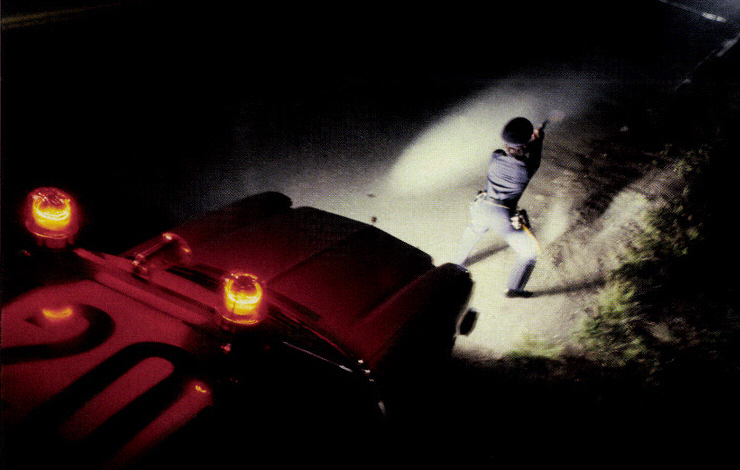Errol Morris' The Thin Blue Line (1988)

Errol Morris' The Thin Blue Line
by Emanuel Levy
In 1988, Errol Morris' The Thin Blue Line received limited theatrical distribution before its video release and PBS telecast, which made the film slightly more accessible. Yet, arguably no American film of that year was as significant in blurring the boundaries between what's real and reel, and in demonstrating the impact a "small" documentary could have.
Offering a variation on the Hollywood "wrong man" plot, one of Hitchcock's prevalent paradigms, the docu centers on Randall Dale Adams, convicted to death for a crime he didn't commit. Morris became obsessed with Adams while researching another movie about a psychiatrist nicknamed Dr. Death, a popular expert witness at capital trials. Listening to Adams' plea of innocence, Morris decided to narrow his focus and make a crusading film aiming to reopen the case.
A drifter from Ohio, Adams was imprisoned for the murder of policeman Robert Wood in 1976. Adams was riding with David Harris on the day of the murder. When Morris interviewed Harris, then on death row awaiting execution for another murder, his comments suggested that he framed Adams to save his life, and that the authorities were reluctant to reexamine the case because they didn't want to be embarrassed as incompetent or corrupt. Some local lawyers believed police and prosecutors wanted to wrap up the case quickly to preserve Dallas County's conviction rate, then the highest in the state.
Among the records given to Morris by the Dallas District Attorney was evidence that the prosecution bent the guarantees of fair trial in efforts to obtain conviction. The prosecution and police were so anxious to charge Adams that they concealed critical testimony. Morris believed that a conspiracy existed between those agencies.
Adams' lawyer went back to court, and a Texas judge upheld a lower court's recommendation to set aside the conviction. The judge claimed the state was guilty of suppressing evidence favorable to the accused, deceiving the court and knowingly using perjured testimony.
The case was reopened due to Morris' exposure of misconduct. The crucial element--and the doc's climax--was Harris' confession on record, claiming he framed Adams because former assistant DA Doug Mulder promised him a deal if he talked. Mulder denied the charge, though pending felony counts against Harris were suspiciously dropped. Adams was released after years in jail for a crime he didn't commit. At one point, only three days from being executed, Adams was saved by the US Supreme Court due to a legal technicality.
Morris broke many rules in his landmark docu, which makes no attempt at "fairness," emphatically taking the position that Adams is innocent. Disregarding detachment, Morris became an impassioned advocate for Adams. Moreover, he mixed and matched interviews with surviving participants with recreations, by professional actors, of the events.
The Thin Blue Line created furor when it failed to be nominated for the Best Documentary Oscar, arguably because of its staged sequences. "Purists" charged Morris with violating the form's sanctity by augmenting reality with theatrical devices, and by presenting a stylized, almost surreal version of the legal process.
The Thin Blue Line is both a riveting criminal investigation and an intriguing meditation on the fine line between truth and fiction; in fact, the film reinvents the story while revisiting it. Morris' feature is a work of pulp fiction, a noir expos filled with stylized images and presumably minor details that nonetheless increasingly assume greater importance. Morris explores the darker side of American justice, immoral motivations, withheld data, interpretations of "facts" and the inevitably murky and Rashomon-like nature of "truth." To his credit, he doesn't claim to fully understand Adams, and each sequence raises more questions than he could possibly answer.
Emanuel Levy is a film professor, author of nine film books, including Cinema of Outsiders: The Rise of Independent Film, and a film critic. A two-time president of the L.A. Times Film Critics Association, Levy is former senior critic of Variety, chief critic of Screen International, and now editor of the acclaimed website, EmanuelLevy.com.
